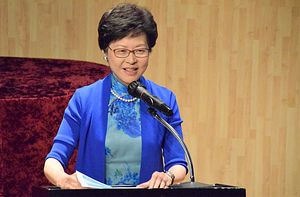As the dust settles after the Hong Kong chief executive election, more questions than answers have arisen. Carrie Lam Cheng Yuet-ngor has become the first female chief executive designate, and will be the fourth chief executive of the Hong Kong Special Administrative Region when her term starts on July 1, 2017.
On Sunday, March 26, Lam won the election as she had been expected to, despite being well behind her closest rival and former colleague John Tsang Chun-wah in every independent public opinion poll.
To clarify, the Hong Kong chief executive elections are not open to the public. Rather, the only votes come from the 1,194 “Election Committee” members comprising Hong Kong’s billionaire tycoons and business sector representatives, as well as mostly pro-Beijing politicians, and a bloc of 326 pan-democrat politicians.
Carrie won 65 percent of the vote with 777 tickets. More alarmingly former Financial Secretary Tsang took just 30.5 percent or 364 votes, overwhelmingly composed of the 326 pan-democrat tickets.
“I once thought perhaps I could turn the tables by the end of the match, just like Barcelona did in that epic game,” said Tsang, referencing the Spanish soccer team’s recent comeback in a Champions League game.
“But the fact is, you might not be able to win for sure no matter how good your team played, even when you have support from fans and keep scoring.”
The fact that Tsang was only able to gain an additional 38 votes is alarming in that it suggests that Beijing’s soft influence over the business sectors representatives and tycoons only seems to be growing in spite of popular opinion. Like a biased employer, China made no secret of their support for Carrie Lam, and the lack of trust they had in Tsang. In the lead up to the elections, the Chinese administration made clear displays of favoritism toward Lam, including invites to Beijing, while largely snubbing Tsang.
“The election has signaled to all aspirants that they have absolutely no chance of winning if they are not heavily trusted by the central government, regardless of their capability,” Liberal Party leader Felix Chung Kwok-pan was quoted as saying by the South China Morning Post. “This election, everybody knows that the popularity and capability of the candidates no longer matter.”
Lam’s victory came with an increasingly familiar scene: the viewing gallery full of lackluster retirees wearing the same uniform outfits — a black hat, a red vest, or a yellow shirt — who sprang into action on the winner’s announcement, waving Chinese flags for exactly two minutes before sitting down again. Other familiar scenes included the increasingly diminutive group of protesters waving their own yellow banners calling for universal suffrage outside, and the feigned surprise reaction from the smiling winner.
Lam’s elevation seems to be setting the precedent of doing away with paying any attention to popular opinion in Hong Kong, and heading straight to an anointment of sorts as is often the case in Chinese politics. If this is indeed the way forward for Beijing, then it would be in line with the long held belief that Beijing is determined to demote Hong Kong to just another Chinese city.

































